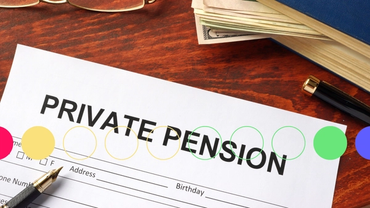Will there still be a State Pension when I retire?
By Boring Money
6 Mar, 2025
When you think of retirement, do you fondly picture government payouts every week and free bus passes? If you do – and if you’re still a fair way off from enjoying it yourself – you may be in for a bit of a shock. Not everyone is eligible for the State Pension, and to make matters worse, it might not be around forever - some experts think it could be abolished altogether.

In a nutshell
So what can you do to prepare yourself for retirement when the State Pension isn’t necessarily guaranteed?
Will there be a State Pension when I reach retirement age?
The answer to this question isn’t set in stone yet, but there have been rumours about the State Pension being abolished for several years. Back in 2018, the Government Actuary’s Department (GAD) estimated that the UK’s increasingly ageing population could drive the State Pension fund to run dry by 2033. Quite simply because we’re paying out more than we’re putting in.
The money for the State Pension comes mostly from National Insurance contributions, and at the time the GAD released their 2022 report, there were 1,000 contributing workers to every 270 claiming pensioners. They estimated that by 2086 this would rise to 1,000 workers to every 430 pensioners. If we were already overdrawn 5 years ago, it’s not difficult to imagine that this could be the straw that breaks the Treasury camel’s back![1]
Indeed, it appears that many of us are already anticipating a future without the State Pension in it. A 2023 report by thinktank Phoenix Insights estimates that half of Brits under the age of 50 believe that “there probably won’t be a State Pension by the time they retire”. Worryingly, almost one in five (19%) of people aged between 50 and 64 (just years away from retirement!) agree with this statement too.
Even with the State Pension still around for the time being, it’s not enough for most people to make ends meet. The full new State Pension for the 2025-26 tax year is just £230.25 per week (assuming you qualify for it – more details on this in our State Pension guide). From April 2026, it will rise to ££241.30 per week.
According to data from the Office for National Statistics (ONS), in July 2025, the average total weekly pay in the UK was £722.[2] So the full State Pension is currently only around 31% of what the average British worker would typically earn in their weekly pay.

Deadline for State Pension top-ups is approaching
Meanwhile, there are some definitive changes to the State Pension rules on the horizon - chiefly that the window to plug gaps in your National Insurance (NI) record is closing on 5 April 2025.
The clock is ticking for people to take advantage of the opportunity to plug gaps in their state pension record going back to 2006. In less than six weeks the window slams shut and you will only be able to plug gaps going back six tax years. With the most recent data showing more than 1.1m pensioners receiving less than £200 per week in new state pension there is much to be gained by taking a look at what you are on track to receive and see if you can boost it.
How to top-up your State Pension
If you have gaps in your NI record and you would like to top it up to boost your State Pension entitlement, here's what you need to do:
If you're below State Pension age, get a State Pension forecast or contact the Future Pension Centre
If you're over State Pension age, contact The Pension Service
Filling gaps in your NI record will cost you approximately £824 per year (partial years cost less). For each year you fill, you get an extra 1/35th of State Pension - which works out at around £328.
This means that as long as you live more than three years after the State Pension age, you'll have made your money back.
Before handing over any money, it's wise to check with the Future Pension Centre to make sure it's really worth it - especially given the cost of purchasing the lost NI credits. It won't make sense for everyone.
How the future of the State Pension might affect you
As for the future of the State Pension on the whole, Graham Wells, Financial Coach & Chartered Financial Planner, thinks it's relatively unlikely that it will be altogether scrapped - but that some changes may be in store in the future:
"Although there is speculation that the State Pension could be abolished at some point, this would be a hugely controversial policy and a deeply unpopular political move," Wells says. "It’s hard to imagine its complete removal any time soon, but I think we need to accept that some kind of redesign is likely.
"The Institute for Fiscal Studies has suggested that the State Pension is not in need of wholesale change, but should become based upon a ‘target level’, expressed as a share of median full-time earnings. It also recommends that it should continue to rise with inflation and that the State Pension age should only rise if longevity at older age increases.
"If these recommendations were adopted by the government, it would be fair to expect an end to the ‘triple lock’ guarantee and I wouldn’t be surprised if we saw a further increase to the State Pension age."
Of course, nobody knows for sure if the State Pension will be scrapped - so don’t start panicking just yet. Besides, it’s not like the government will introduce a Logan’s Run policy or get Thanos to snap his fingers. If it gets as bad as the GAD predicted, the government will almost certainly do something about it. But this ‘something’ probably won’t be very cosy, and since the full State Pension isn’t much to live off even now, it’s better to start finding other ways to protect yourself and boost your retirement income.
"The State Pension will continue to remain a useful cornerstone of retirement planning for most people in the UK," Wells agrees, "but it certainly won’t provide a standard of living above the most basic level.
"More than ever before, we have an individual responsibility to plan for our futures. That could mean accumulating our own pensions and investments, finding meaningful work that we can enjoy into old age, or a blended approach where we can look forward to a State Pension, some personal or occupational pensions, part-time earned income and a back-up of savings and investments.
Are you on track with your retirement savings?
It can be tricky to understand if what you're putting into your pot is going to be enough to live off of when you retire. That's where we can help! Take our retirement savings quiz to calculate how much you've already got, how much you'll need, and some handy tips to give you a boost if you're a bit behind!
---






